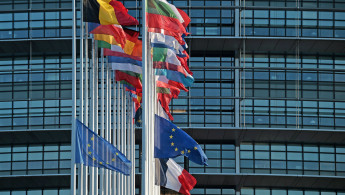121 hit in new EU sanctions over Russia's war
New EU sanctions over Russia's war in Ukraine adopted on Saturday target 121 individuals and entities, including Iranian drone manufacturers, officials said.
The measures, agreed late Friday ahead of Saturday's formal adoption, are the 10th round of European Union sanctions aimed at undercutting Russia's finances and military supplies used in its invasion that started a year ago.
They echo sanctions announced Friday by the United States and by Britain, and follow up on a G7 statement that warned of penalties for any country abetting Russia in its war.
The successive round of EU measures are "the most far-reaching sanctions ever - depleting Russia's war arsenal and biting deep into its economy," European Commission chief Ursula von der Leyen said.
"We are also turning up the pressure on those trying to circumvent our sanctions."
The latest EU sanctions target an additional 96 Russian entities - meaning businesses or state agencies - including another three Russian banks, according to an EU statement.
Seven Iranian entities are included this round, all manufacturers of self-exploding drones Russia has been using to strike Ukrainian targets including infrastructure and residential buildings.
"If Russia develops that level of sanctions-evasion sophistication, Iran's role in developing these drones will no longer be as critical."
— The New Arab (@The_NewArab) February 15, 2023
Russia and beyond: Why Iran builds drone factories in other countries ⬇ https://t.co/6zuXSyzUPo
An export ban on industrial goods to Russia is expanded to include dual-use items like electronics, specialised vehicles, machine parts, spare parts for trucks and jet engines, antennae, cranes, drones, rare earth materials, electronic circuits and thermal cameras.
Trade in those goods, which battlefield evidence suggests Moscow is using for its war, amount to more than 11 billion euros ($12 billion), according to EU officials.
Sanctions on Russia's propaganda outlets were stepped up, with moves to suspend the broadcasting licences of the Arabic outlets of state-controlled media groups RT and Sputnik, which are already banned in Europe.
And the measures required EU member states to make more detailed reporting on assets seized from sanctioned wealthy Russians supporting the Kremlin, and frozen Russia Central Bank funds.
As part of our listings, we are targeting those responsible for the deportation and forced adoption of at least 6.000 Ukrainian children.
— Josep Borrell Fontelles (@JosepBorrellF) February 25, 2023
This is a clear violation of international law, including the Geneva convention, as I raised at UN Security Council yesterday.
2/2 pic.twitter.com/MfeqxkZ3Hk
EU foreign policy chief Josep Borrell said a total 121 entities and individuals were on the latest sanctions list, details of which were expected later Saturday when they were to be published in the European Union's official gazette.
Being on the list means an asset freeze in the EU and a visa ban.
Borrell said the latest round also targets "those responsible for the deportation and forced adoption of at least 6,000 Ukrainian children" in violation of international law.
"We will continue to increase pressure on Russia - and we will do it for as long as needed, until Ukraine is liberated from the brutal Russian aggression," he said.





 Follow the Middle East's top stories in English at The New Arab on Google News
Follow the Middle East's top stories in English at The New Arab on Google News


